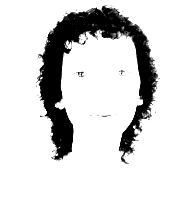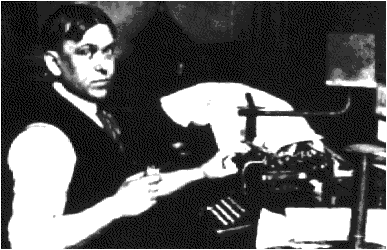H. L. Mencken is here, too, but the editors have arbitrarily excluded book reviews, so we miss his fine writing for The American Mercury and The Smart Set. (See, for example, his excellent study of American Education in an earlier issue of this magazine.)Vladimir Nabokov turns up with the gorgeous first chapter from Speak Memory, but we must ask if a White Russian who cuts his literary teeth in England and France and dies in Switzerland really American? S. J. Perelman, an old fave of ours, comes with instructions on how to wrestle a toy together, but a chapter, any chapter from Acres and Pains would have been far funnier.
§ § §Then there's the matter of "They All Just Went Away," by Joyce Carol Oates. By including it, the editors are saying that it is one of fifty-five best American essays of the century.
The Century.
Incest is best, right?
Actually, the story does have a touch of incest, but it has something more important: the feel of something tossed in the salad-bowl by one who has no trouble stringing 2,000 or 3,000 words together on a hot Wednesday afternoon. "Now what should I write about?" Ms. Oates asks herself. "Remember, this is going to be listed as one of the best essays of the century." How about ...
Yes, that's it! Those peasants who lived down the way from us when we were growing up --- poor white trash named Weidel. There were some brothers in prison, the father beat up on the wife something awful (bit of boxing lore here), they say he did something bad to the daughters (there were rumors) --- and finally, he burned down the house. That's the ticket: noisome neighbors in our almost perfect small town of Millersport, N. Y. contrasted --- good literary trick --- with a normal and happy family.
How to cook it together quickly (we don't have much time: there are those classes at Princeton, a book review due next week for the NYRB and that speech at the MLA). How about some lists --- lists are big now --- like what was left over after the Weidel house burned up?
Children's clothes, socks and old shoes heaped on the floor...an old sweater of Ruth's, angora-fuzzy...a naked pink plastic doll. Toppled bedsprings, filthy mattresses streaked with yellow and rust-colored stains.
And then...the aftergrowth on the walls: "trumpet vine, wisteria, rose of Sharon, willow..." And what did the old man use to after his wife? "A butcher knife, a claw hammer, the shotgun."
Yes, lists are good, and good for filling up space, but there has to be philosophy somewhere here, brain-juice. How about...let's ask ourselves, what is a house anyway? How about
a structural arrangement of space, geometrically laid out to provide what are called rooms, these divided from one another by verticals and horizontals called walls, ceilings floors.
27 more words (and I like that bit, not rooms, but "what are called rooms.") True, this might not make it in the philosophy department: it's just another list in disguise. So how about... how about something on... ah... reality? How about
For to be a realist (in art or in life) is to acknowledge that all things might be other than they are. That there is no design, no intention, no aesthetic or moral or teleological imprimatur but, rather, the equivalent of Darwin's great vision of a blind, purposeless, ceaseless evolutionary process that yields no "products" --- only temporary strategies against extinction.
Now that's 60 words and --- even if I do say so myself --- that's great talk-it-up-in-class stuff for those sophomores at Amherst and Brown and Boston U. --- not to say Berkeley and UCLA and Mills.To be a realist.
Not only in Art, but...in Life.
There is no design. No teleological imprimatur.
(Teleological imprimatur!)
Only blind, purposeless, ceaseless evolutionary process...
Dynamite.

